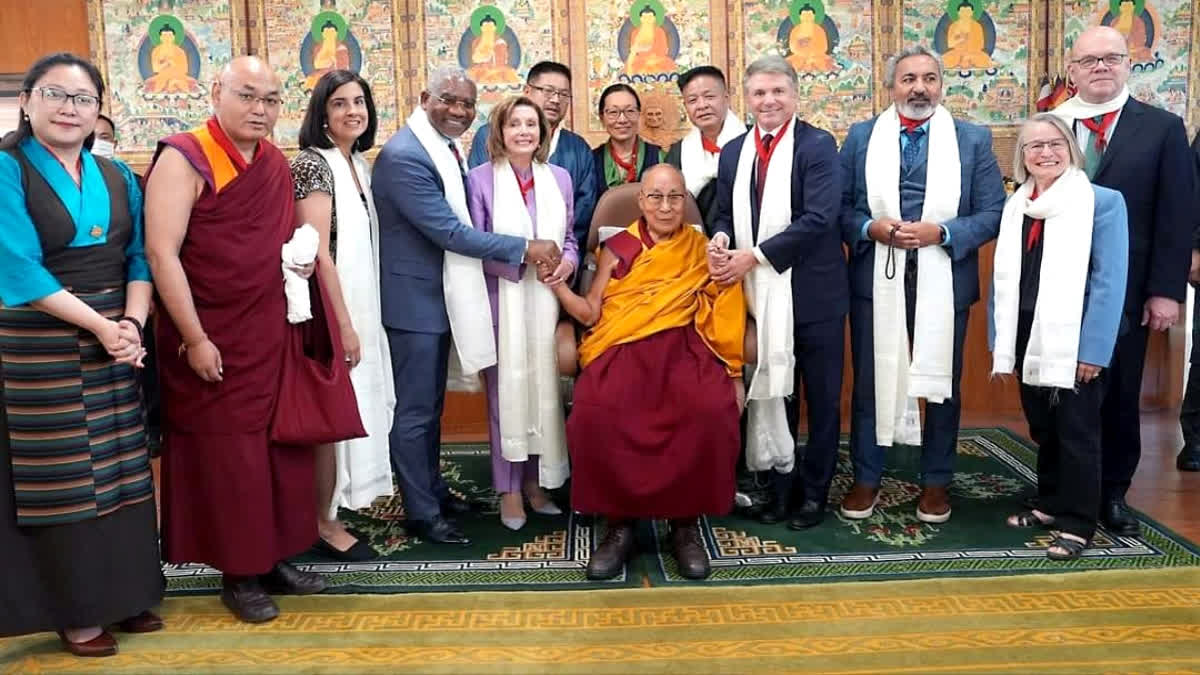A seven-member bipartisan congressional delegation of the US Congress led by Michael McCaul, the Republican chair of the House Foreign Affairs Committee, was in India early this week to meet His Holiness 14th Dalai Lama in Dharmshala. One of its members was the Congresswoman and the former speaker of the Congress Nancy Pelosi.
On 19th June, the delegation met the members of the Tibetan Parliament in Exile and the Tibetan Government in Exile before meeting Dalai Lama. This visit, preceded by the "Promoting a Resolution to the Tibet- China Dispute Act" also known as the "Resolve Tibet Act" by both houses of the USA on 12th June, obviously drew China's ire.
The legislation clearly states that the USA stands with the fight of the people of Tibet against its illegal occupation by China. The Resolve Tibet Act seeks to recognise and address the multi-faceted socio-cultural identity of the Tibetan people, in particular, their "distinct historical, cultural, religious, and linguistic identity" and authorises the use of funds to counter Chinese disinformation about Tibet "including disinformation about the history of Tibet, the Tibetan people, and Tibetan institutions, including that of the Dalai Lama."
China's reaction to the visit to Dalai Lama was expectedly very sharp. In an op-ed published on 20 June, the mouthpiece of the Chinese Government, the Global Times accused Pelosi of having forgotten the tragic experience of the Native Americans and instead being enthusiastic about making irresponsible remarks about Xizang (Tibet).
It branded the "Resolve Tibet Act" as "a waste paper and purely a self-amusing performance." Calling Dalai Lama an "out and out secessionist who is more and more disdained by the international community," the paper opined that the "Dalai card that US politicians think can win more political capital and create barriers for China is actually a lousy one." China also accuses that the Dalai Lama is 'not a purely religious figure'.
After Communist China invaded Tibet and annexed it in 1950, it started the process of sinicisation of the region. Changing the demography of the region by settling more and more Han people there, China began a forced assimilation of Tibetan identity into the dominant Han identity.
It is strongly believed that millions of Tibetan children were separated from their parents at an early age and were sent to boarding schools to be brainwashed into communist ideology. They were taught Mandarin, and communism and were meticulously kept out of the traditional Tibetan culture.
A case in example was Gadhun Ghoeky Nyima, a six years old boy recognised by Dalai Lama as the 11th Panchen Lama in 1995 (in Tibetan tradition, every Dalai Lama recognises the next Panchen Lama, the second highest spiritual figure after Dalai Lama, and vice versa). Within two days of this recognition, the boy was kidnapped by the Chinese forces and his whereabouts are not known till today.
China promptly appointed Ciain Cain Norbu as the 11th Panchen Lama who was obviously not recognised by the Dalai Lama. The current Panchen Lama is expectedly a Chinese protegee.
China is interested in Tibet's minerals as the plateau sits on vast reserves of coal, copper, chromium, lithium, Zink, lead, boron and is a major resource of hydel power and mineral water. This is why China is fast developing the infrastructure in the region though the indiscreet mining and industrialisation have caused a grave environmental threat to the consternation of the local population which has been protesting but in vain so far. Through the vast water resources of Tibet, China also wants to browbeat its neighbours by controlling the river systems.
The US interest in Tibet is not new though, at times, it suffered from dwindling focus. From 1950 till 1971, the USA's policy was to cause discomfiture to communist China by all possible means and the Tibetan issue proved to be an effective tool in this endeavour. However, with both nations warming up to each other in the seventies and Chinese modernisation opening new trade opportunities for the USA, this relegated the Tibetan issue to the back seat for about thirty years.
But come the 21st century the US passed three resolutions on Tibet in a short span of less than twenty -five years. The first one, the Tibet Policy Act, of 2002, flagged the ill-treatment of Tibetans by the Chinese Government but it recognised that Tibet was an autonomous region within China.
The third, the Resolve Tibet Act, recently passed by both houses but still awaiting presidential approval, has more substance and a greater operational part. "It authorises the use of funds to counter 'Chinese misinformation on Tibet including disinformation about the history of Tibet, the Tibetan people, and Tibetan institutions, including that of the Dalai Lama, urges China to engage in meaningful direct dialogue with him or his representatives "without pre-conditions" to seek settlement of differences.
It also makes a note of "China's duty as a signatory of two conventions- the International Covenant on Civil and Political Rights and the International Covenant on Economic, Social and Cultural Rights to protect the Tibetan people's "distinct historical, cultural, religious, and linguistic identity."
It is to be noted here that this is in line of the main plank of the policy of Democrats i.e. protection of human rights. Dalai Lama, who was conferred with the Nobel Peace Prize in 1989 despite heavy protest from China, is to visit the US in August this year for a surgery where he is likely to meet senior officials of the US administration and perhaps President Joe Biden also.
The delegation also met with Prime Minister Narendra Modi and highlighted the importance of bilateral relations. As far as India is concerned, we have, since 1950, recognised Tibet as a part of China but have favoured greater autonomy for the region. China, on the other hand, has always been claiming Arunachal Pradesh as its territory to the extent that it always protests any visit of Indian leadership to the region and also refuses to affix Chinese visas on the passports of the residents of the state.
In the current situation where China is involved in the South China Sea embroglio and tension with the West over Ukraine and Israel, it will not take any drastic step in Tibet but, it will keep the issue alive from time to time and so will the USA, at least during its current Government run by the Democrats.



